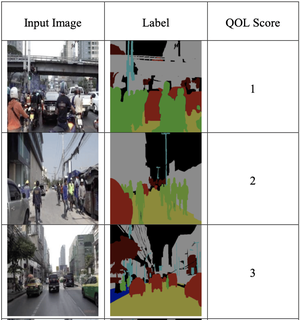Sustainability
In today’s world, urban design and sustainable development are crucial for megacities, impacting residents’ wellbeing. Quality of Life (QOL) is a key performance indicator (KPI) used to measure the effectiveness of city planning. Traditionally, QOL is assessed through costly and time-consuming surveys, but our AI-based approach offers a more efficient solution. Using Bangkok as a case study, we apply deep convolutional neural networks (DCNNs) for semantic segmentation and object detection to gather relevant image data. Then, we use linear regression to infer QOL scores. Our method, tested with state-of-the-art models and public datasets, proves to be a practical alternative for QOL assessment, with implementation codes and datasets available at https://kaopanboonyuen.github.io/bkkurbanscapes.
